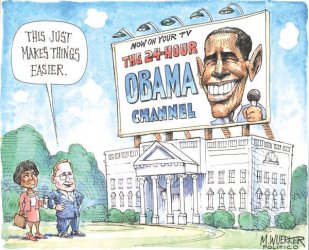Midnight Marauder
Rookie
- Feb 28, 2009
- 12,404
- 1,939
- 0
- Banned
- #1
Without Bush, media lose interest in war caskets | Washington Examiner
The excuses include, "Well, TV crews are expensive. Overtime, travel..." But that didn't stop the initial fervor to have casket video reports.
Now apparently, with Obama in office, there's not the same zeal to show war casualties in flag draped coffins. Almost like it's not cool anymore.
Wonder why?
Read more at link.Remember the controversy over the Pentagon policy of not allowing the press to take pictures of the flag-draped caskets of American war dead as they arrived in the United States? Critics accused President Bush of trying to hide the terrible human cost of the wars in Iraq and Afghanistan.
In April of this year, the Obama administration lifted the press ban, which had been in place since the Persian Gulf War in 1991. Media outlets rushed to cover the first arrival of a fallen U.S. serviceman, and many photographers came back for the second arrival, and then the third.
But after that, the impassioned advocates of showing the true human cost of war grew tired of the story. Fewer and fewer photographers showed up. "It's really fallen off," says Lt. Joe Winter, spokesman for the Air Force Mortuary Affairs Operations Center at Dover Air Force Base in Delaware, where all war dead are received. "The flurry of interest has subsided."
That's an understatement. When the casket bearing Air Force Tech. Sgt. Phillip Myers, of Hopewell, Va., arrived at Dover the night of April 5 -- the first arrival in which press coverage was allowed -- there were representatives of 35 media outlets on hand to cover the story. Two days later, when the body of Army Spc. Israel Candelaria Mejias, of San Lorenzo, Puerto Rico, arrived, 17 media outlets were there. (All the figures here were provided by the Mortuary Affairs Operations Center.) On subsequent days in April, there were nearly a dozen press organizations on hand to cover arrivals.
Fast forward to today. On Sept. 2, when the casket bearing the body of Marine Lance Cpl. David Hall, of Elyria, Ohio, arrived at Dover, there was just one news outlet -- the Associated Press -- there to record it. The situation was pretty much the same when caskets arrived on Sept. 5, 9, 10, 12, 13, 14, 16, 22, 23 and 26. There has been no television coverage at all in September.
The excuses include, "Well, TV crews are expensive. Overtime, travel..." But that didn't stop the initial fervor to have casket video reports.
Now apparently, with Obama in office, there's not the same zeal to show war casualties in flag draped coffins. Almost like it's not cool anymore.
Wonder why?



